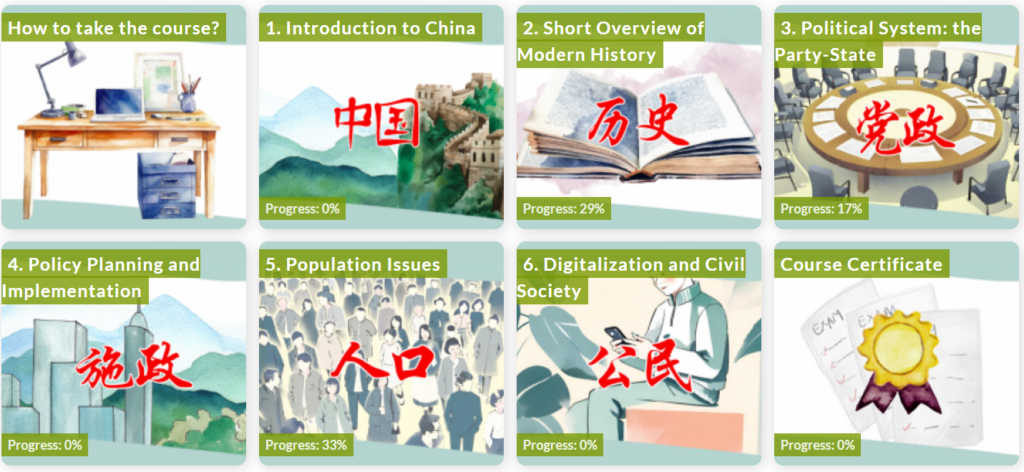WHEN? January 6, 2025 – December 18, 2026
Enroll here: https://digicampus.fi/course/view.php?id=5510

This course provides learners with a solid foundational understanding of contemporary Chinese politics and society. By the end of the course, participants will be able to identify China’s key political and administrative institutions, while also gaining a comprehensive grasp of the policy implementation processes within the country. Moreover, learners will explore significant issues prevalent in Chinese society, including migration, inequality, an aging population, digitalization, and the role of civil society.
COURSE MODULES
- Introduction to China
- Short overview of modern history
- Political system: the Party-state
- Policy planning and implementation
- Population issues
- Digitalization, and civil society
CONTENTS
This course comprises six thematic modules. It commences with the module “Introduction to China” designed to impart fundamental knowledge about China’s geography and population. The second module “Short overview of Modern History” spans from the mid-19th century up to the present day. A solid grasp of this historical backdrop is essential for comprehending contemporary developments.
The module titled “Political system: The Party-state” elucidates the organization of the Communist Party and the state administration. It further expounds on their interconnections and hierarchical structures, extending to the grassroots level. The subsequent module introduces China’s mechanism for policy planning and implementation, along with the dynamics of central-local relations. Within this module, policy implementation is dissected through a case study on environmental policy.
The first of the society-oriented modules “Population issues” elucidates China’s demographic challenges and the intricate patterns of domestic migration. Additionally, it delves into the disparities in life choices that confront the youth across various societal strata. The final module “Digitalization and, civil Society” confronts the pervasive digitization in China. It also scrutinizes the challenges encountered by China’s civil society, encapsulating both online and offline forms of protest.
MATERIALS
The core materials consist of short (20 min) recorded lectures and slide decks that are prepared by leading experts on China. In addition, the versatile learning materials include timelines, infographics, podcasts and open access online materials. Learners will also get acquainted with central sources of information about China, including selected Chinese webpages. The learning experience is enriched by various types of automatically graded assignments.
TAKEN AS
Asynchronous learning allows students to customize their study schedules and progress independently. Each module consists of learning materials, assignments and an exam. The assignments vary in length and difficulty, and have limitless attempts. The exams consist of six randomly selected multiple-choice questions. There are three attempts for each exam. In order to complete the course and receive a course certificate, students need to pass all assignments and exams within the course period.
The course is graded pass/fail. When students have successfully completed all assignments and exams, they may produce an automatically generated course certificate of completion. The certificate can be digitally verified. The course is worth 3 ECTS credits (ca 80 hours of work). The courses are run on the DigiCampus learning platform. Students can sign up on this page https://digicampus.fi/course/index.php?categoryid=247.
For more information, please contact Dr Outi Luova at outi.luova@utu.fi, CEAS, University of Turku